Search titles
Displaying results 181 to 190 of 856.

Framing the Islands »
Power and Diplomatic Agency in Pacific Regionalism
Authored by: Greg Fry
Publication date: October 2019
Since its origins in late eighteenth-century European thought, the idea of placing a regional frame around the Pacific islands has never been just an exercise in geographical mapping. This framing has always been a political exercise. Contending regional projects and visions have been part of a political struggle concerning how Pacific islanders should live their lives. Framing the Islands tells the story of this political struggle and its impact on the regional governance of key issues for the Pacific such as regional development, resource management, security, cultural identity, political agency, climate change and nuclear involvement. It tells this story in the context of a changing world order since the colonial period and of changing politics within the post-colonial states of the Pacific.
Framing the Islands argues that Pacific regionalism has been politically significant for Pacific island states and societies. It demonstrates the power associated with the regional arena as a valued site for the negotiation of global ideas and processes around development, security and climate change. It also demonstrates the political significance associated with the role of Pacific regionalism as a diplomatic bloc in global affairs, and as a producer of powerful policy norms attached to funded programs. This study also challenges the expectation that Pacific regionalism largely serves hegemonic powers and that small islands states have little diplomatic agency in these contests. Pacific islanders have successfully promoted their own powerful normative framings of Oceania in the face of the attempted hegemonic impositions from outside the region; seen, for example, in the strong commitment to the ‘Blue Pacific continent’ framing as a guiding ideology for the policy work of the Pacific Islands Forum in the face of pressures to become part of Washington’s Indo-Pacific strategy.

Levelling Wind »
Remembering Fiji
Authored by: Brij V. Lal
Publication date: October 2019
‘What I have sought to do in my work is to give voiceless people a voice, place and purpose, the sense of dignity and inner strength that comes from never giving up no matter how difficult the circumstances. History belongs as much to the vanquished as to the victors.’
— Brij V. Lal
‘Professor Brij Lal is the finest historian of the Indian indentured experience and the Indian diaspora. His Girmitiyas is a classic.’
— Emeritus Professor Clem Seecharan, London Metropolitan University
‘Brij Lal is a highly respected, versatile and imaginative scholar who has made a lasting contribution to the historiography of the Pacific.’
— Dr Rod Alley, Victoria University of Wellington
‘Professor Brij Lal’s life is a remarkable journey of a scholar and an intellectual whose writings are truly transformative; a man of moral clarity and courage who also has deep pain at being cut off from his homeland.’
— Professor Michael Wesley, Dean of the College of Asia and the Pacific, The Australian National University
‘Brij Lal is a singular scholar, whose work has spanned disciplines – from history, political commentary, encyclopedia, biography and “faction”. Brij is without doubt the most eminent scholar in the humanities and social sciences Fiji has ever produced. He also remains one of the most significant public intellectuals of his country, despite having been banned from entering it in 2009.’
— Emeritus Professor Clive Moore, University of Queensland
‘Brij Lal is an accomplished and versatile historian and true son of Fiji. Above all, there is affirmation here of the enduring worth of good literature and the value of good education that Lal received and wants others to experience. The world needs more Lals who speak out against ruling opinions and dare to stray into the pastures of independent thought.’
— Professor Doug Munro, historian and biographer, Wellington, and Adjunct Professor at the University of Queensland
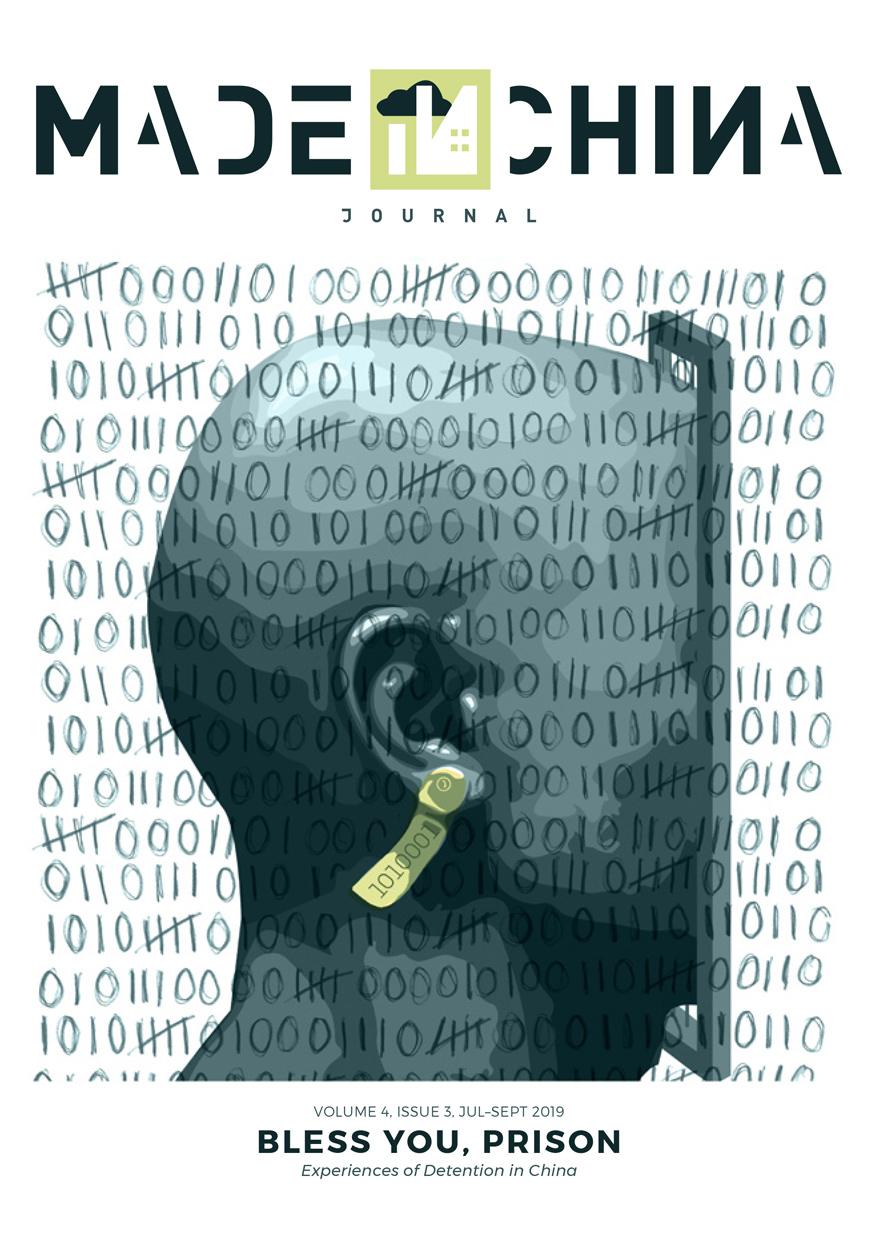
Made in China Journal: Volume 4, Issue 3, 2019 »
Edited by: Ivan Franceschini, Nicholas Loubere
Publication date: September 2019
Bless you prison, bless you for being in my life. For there, lying upon the rotting prison straw, I came to realise that the object of life is not prosperity as we are made to believe, but the maturity of the human soul.
— Alexandr I. Solzhenitsyn, The Gulag Archipelago (1918-1956)
With these words, Soviet star dissident Aleksandr Solzhenitsyn exalted the transformative role of the gulag—where he had been imprisoned for eight years—in reconfiguring his soul. Just like his account of life in the labour camps played a fundamental role in shaping public perceptions of the Soviet labour camps, our views of the Chinese detention system are also widely shaped by the writings and testimonies of former political prisoners, whether victims of the mass campaigns of the Mao era or more recent crackdowns against dissident voices. Reading these accounts, detention easily assumes the tragic connotations of martyrdom, and detainees come to be surrounded by a halo of heroism. But what about those uncountable prisoners who are detained for common crimes or less-noble causes? What about the reality of murderers, thieves, drug addicts, and prostitutes? Is prison a blessing for them too?
This issue of the Made in China Journal aims to provide a more balanced account of Chinese experiences of detention by examining situations as diverse as reeducation camps in Xinjiang, forced detox camps for drug addicts, involuntary hospitalisation of people with mental health problems, the contested legacies of labour camps from the Maoist past, and the latest reforms in the fields of Chinese criminal justice. Such grim analyses are also key to understanding the upheavals that are currently taking place in Hong Kong. We should not forget that the popular mobilisations of these past months began in response to attempts by the Hong Kong authorities to pass an extradition bill that would have established a new case-by-case model to transfer fugitives to any jurisdiction that the former British colony lacks a formal agreement with, including mainland China. Reading the accounts included in this issue of the journal, it is not difficult to understand why this became a flashpoint.
Download for free
Not available for purchase

The Realities and Futures of Work »
Authored by: David Peetz
Publication date: September 2019
What do we know about the current realities of work and its likely futures? What choices must we make and how will they affect those futures? Many books about the future of work start by talking about the latest technology, and focus on how technology is going to change the way we work. And there is no doubt that technology will have huge impacts. However, to really understand the direction in which work is going, and the impact that technology and other forces will have, we need to first understand where we are.
This book covers topics ranging from the ‘mega-drivers of change’ at work, power, globalisation and financialisation, to management, workers, digitalisation, the gig economy, gender, climate change, regulation and deregulation. In doing this, it refers to some of the great works of science fiction. It demolishes several myths, such as that the employment relationship is doomed, that we are all heading to becoming ‘freelancers’ or ‘gig workers’ one day, that most jobs will be destroyed by technological change, that the growth in jobs will mainly be in STEM fields, that we will no longer value collectivism as we will all be ‘individuals’, or that the death of unionism is inevitable.
The Realities and Futures of Work also rejects the idea of technological determinism—that whatever will be, will be, thanks to technological change—and so it refuses to accept that we simply need to prepare to adapt ourselves to the future by judicious training since there is nothing else we can do about it. Instead, this book provides a realistic basis for thinking about both the present and the future. It emphasises the choices we make, and the implications of those choices for the future of work.

Contested Terrain »
Reconceptualising Security in the Pacific
Authored by: Steven Ratuva
Publication date: September 2019
Contested Terrain provides a cutting-edge, comprehensive and innovative approach to critically analysing the multidimensional and contested nature of security narratives, justified by different ideological, political, cultural and economic rationales. This is important in a complex and ever-changing situation involving a dynamic interplay between local, regional and global factors. Security narratives are constructed in multiple ways and are used to frame our responses to the challenges and threats to our sense of safety, wellbeing, identity and survival but how the narratives are constructed is a matter of intellectual and political contestation. Using three case studies from the Pacific (Fiji, Tonga and Solomon Islands), Contested Terrain shows the different security challenges facing each country, which result from their unique historical, political and socio-cultural circumstances. Contrary to the view that the Pacific is a generic entity with common security issues, this book argues for more localised and nuanced approaches to security framing and analysis.

Agenda - A Journal of Policy Analysis and Reform: Volume 26, Number 1, 2019 »
Edited by: William Coleman
Publication date: September 2019
Agenda is a refereed, ECONLIT-indexed and RePEc-listed journal of the College of Business and Economics, The Australian National University. Launched in 1994, Agenda provides a forum for debate on public policy, mainly (but not exclusively) in Australia and New Zealand. It deals largely with economic issues but gives space to social and legal policy and also to the moral and philosophical foundations and implications of policy.
Subscribe to the Agenda Alerting service if you wish to be advised on forthcoming or new issues.
Download for free
Not available for purchase
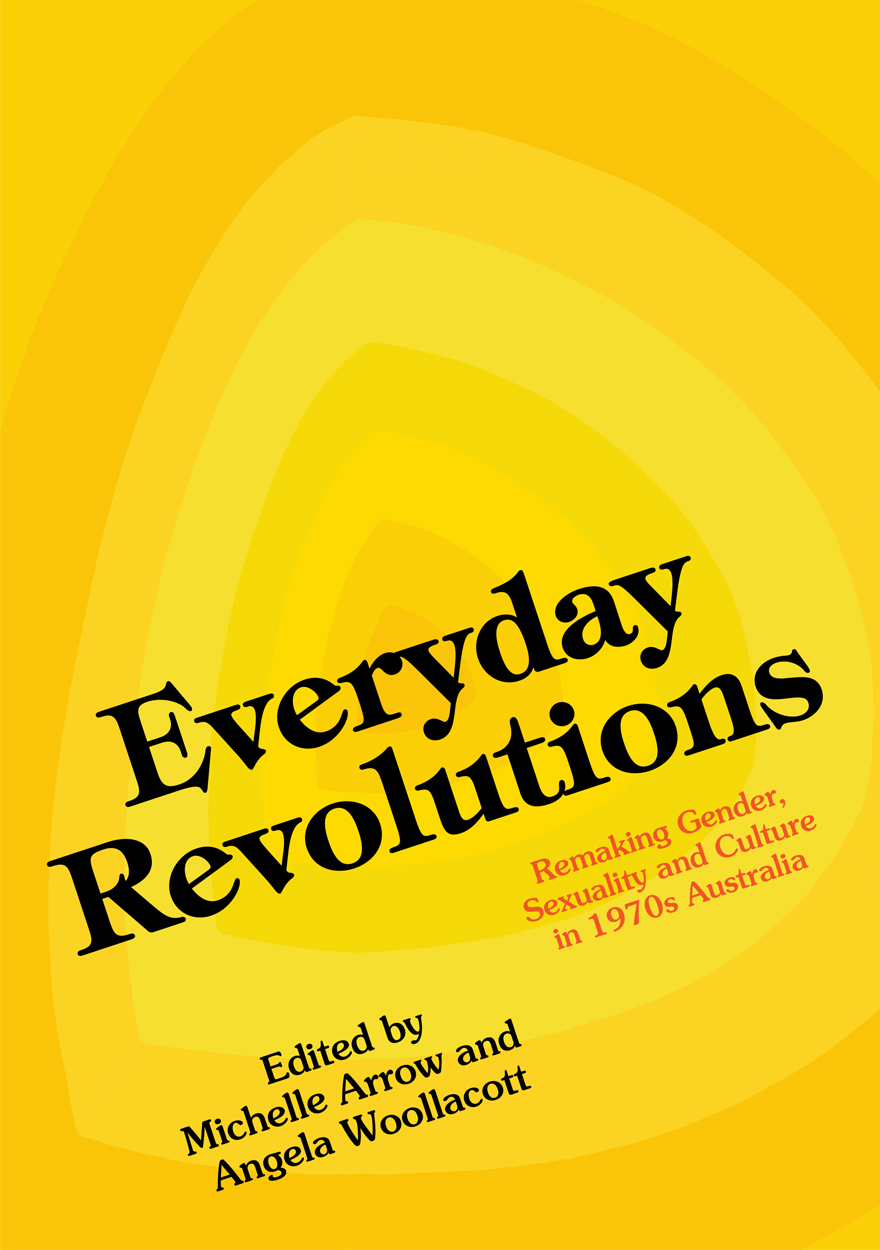
Everyday Revolutions »
Remaking Gender, Sexuality and Culture in 1970s Australia
Edited by: Michelle Arrow, Angela Woollacott
Publication date: August 2019
The 1970s was a decade when matters previously considered private and personal became public and political. These shifts not only transformed Australian politics, they engendered far-reaching cultural and social changes. Feminists challenged ‘man-made’ norms and sought to recover lost histories of female achievement and cultural endeavour. They made films, picked up spanners and established printing presses. The notion that ‘the personal was political’ began to transform long-held ideas about masculinity and femininity, both in public and private life. In the spaces between official discourses and everyday experience, many sought to revolutionise the lives of Australian men and women.
Everyday Revolutions brings together new research on the cultural and social impact of the feminist and sexual revolutions of the 1970s in Australia. Gay Liberation and Women’s Liberation movements erupted, challenging almost every aspect of Australian life. The pill became widely available and sexuality was both celebrated and flaunted. Campaigns to decriminalise abortion and homosexuality emerged across the country. Activists set up women’s refuges, rape crisis centres and counselling services. Governments responded to new demands for representation and rights, appointing women’s advisors and funding new services.
Everyday Revolutions is unique in its focus not on the activist or legislative achievements of the women’s and gay and lesbian movements, but on their cultural and social dimensions. It is a diverse and rich collection of essays that reminds us that women’s and gay liberation were revolutionary movements.
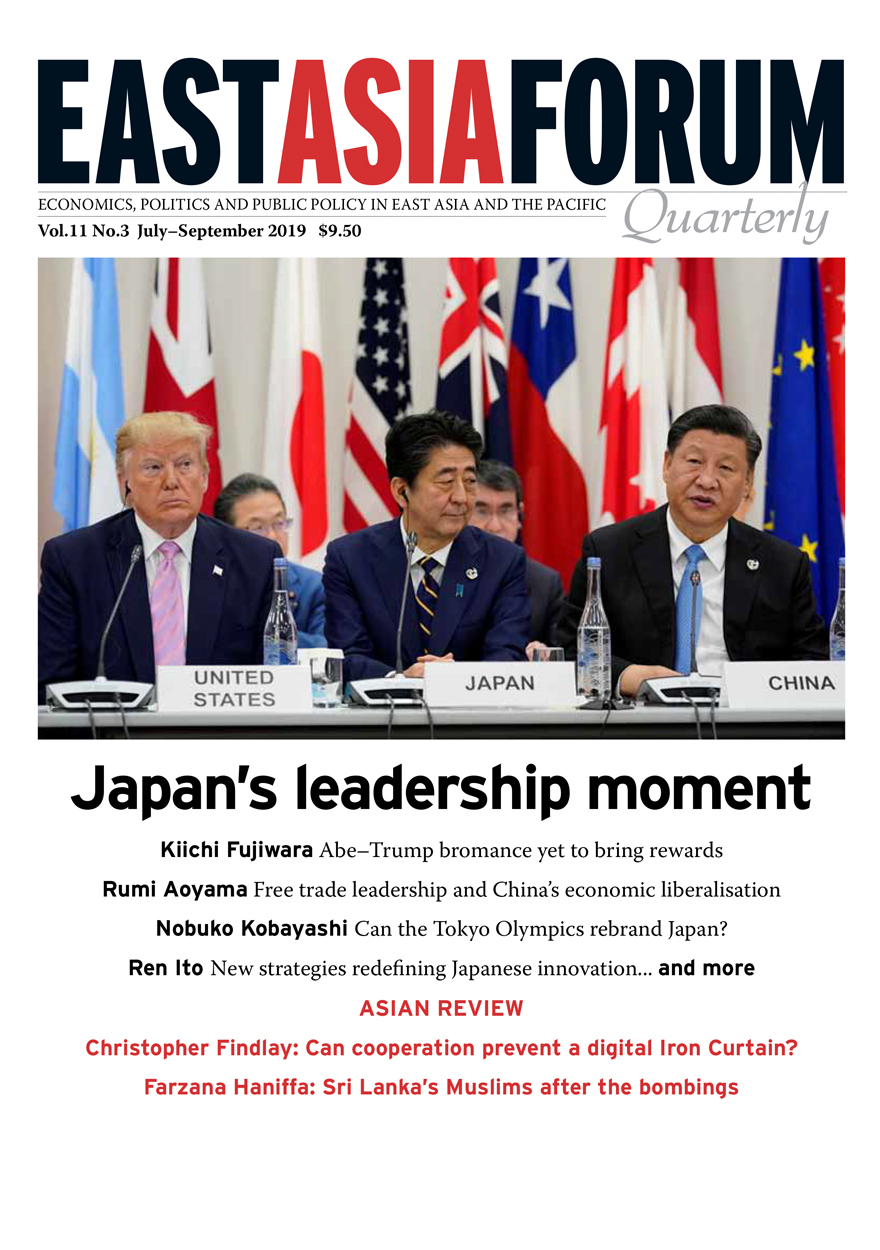
East Asia Forum Quarterly: Volume 11, Number 3, 2019 »
Publication date: August 2019
When Shinzo Abe was given a second chance at the Japanese prime ministership in 2012, Japan was in the throes of a period of intense domestic turmoil. After six prime ministers in six years, the nation was in desperate need of political stability. Abe has not only delivered that but is now set to become the longest-serving prime minister in modern Japanese history.
Abe commenced his second term with an ambitious policy program focused on reinvigorating the nation’s stagnant economy, amending the constitution to achieve a more ‘normal’ defence and security policy, and engaging proactively in regional and global affairs.
To what extent has Abe achieved these policy goals? How has he utilised the immense political capital accrued throughout his leadership tenure? And what will be the legacy that Abe leaves when his prime ministership ultimately comes to an end? In this issue of East Asia Forum Quarterly, scholars from both inside and outside Japan grapple with these questions.
East Asia Forum Quarterly grew out of East Asia Forum (EAF) online, which has developed a reputation for providing a platform for the best in Asian analysis, research and policy comment on the Asia Pacific region in world affairs. EAFQ aims to provide a further window onto research in the leading research institutes in Asia and to provide expert comment on current developments within the region. The East Asia Forum Quarterly, like East Asia Forum online, is an initiative of the East Asia Forum (EAF) and its host organisation, the East Asian Bureau of Economic Research (EABER) in the Crawford School of Economics and Government in the College of Asia & the Pacific at The Australian National University.
Download for free
Not available for purchase
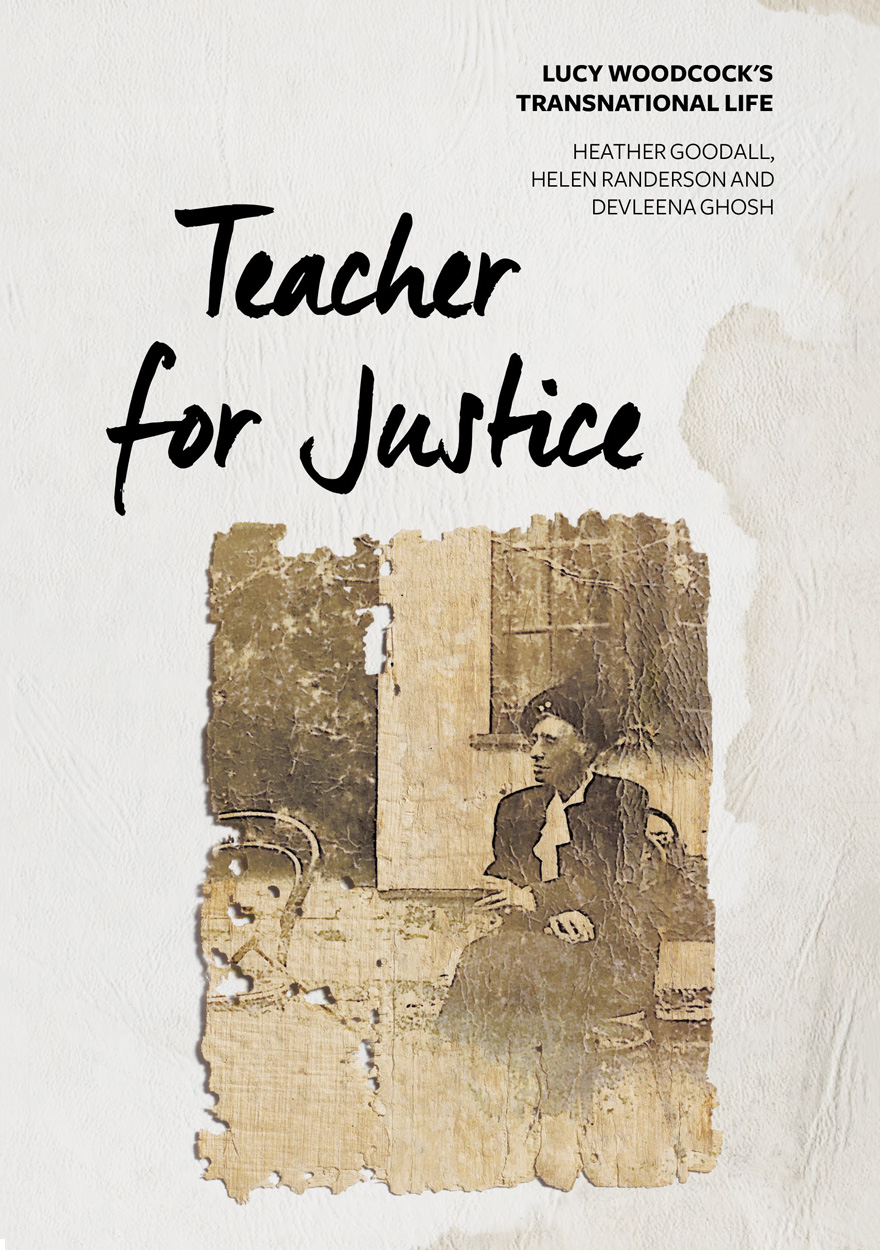
Teacher for Justice »
Lucy Woodcock's Transnational Life
Publication date: August 2019
‘Teacher for Justice is a major contribution to the history of the women’s movement, working‑class activism and Australian political internationalism. But it is more than this. By focusing on the life of Lucy Woodcock – an unrecognised and under-researched figure – this book rewrites the history of twentieth-century Australia from the perspective of an activist who challenged conventions to fight for gender, race and class equality, exploring the complex and multi-layered intersections of these aspects. It explores Woodcock’s personal relationships and the circles she mixed in and the friendships she forged, as well as the conventions she challenged as a single woman in possibly a same-sex relationship. The book makes a key contribution to the history of progressive education and the experience of women teachers. Above all, it charts the life of a transnational figure who made connections globally and, in particular, with refugees and with women in India and the Asian region. It is a detailed, thoroughly researched and richly textured history which places Woodcock within the context of the times in which she lived.’
Joy Damousi, Professor of History, University of Melbourne
‘Meet Lucy Woodcock, a complex, undaunted woman in a tough and changing world. From her role as a public school principal in Depression and wartime, to her union and feminist organising, to her transnational engagements for peace, this clear and thoughtful book brings to life forgotten forms of activism. It’s the gripping story of how Lucy navigated the minefields of gender, class, race and coloniality to change her world.’
Raewyn Connell, Professor Emerita, University of Sydney
‘Just over a century ago, the last of the pupil-teachers, Lucy Woodcock, co-founded the NSW Teachers Federation. So many of the principles and traditions that underpin our union today can be traced back to the lifelong work of Lucy Woodcock. She fought for the industrial rights of teachers deep in the knowledge of the broader social and economic context in which she lived and worked. Too often the role of working-class women whose influence is profound is ignored. This biography installs Lucy Woodcock into her rightful place as pivotal player in the history of twentieth-century Australia.’
Maurie Mulheron, President, NSW Teachers Federation
‘A fascinating history of a fascinating woman: Lucy’s interests were so broad and so modern – equal pay, racism, internationalism, Indigenous rights and anti-war struggles were all part of Lucy’s world. She had a vision beyond nationalism, championed the cause of world peace when peace was being treated as a dirty word and saw women as global citizens. Lucy was one of the heroes of our disgracefully unfinished Equal Pay struggle.’
Hon Dr Meredith Burgmann, anti-racism and peace activist, former President of the NSW Legislative Council
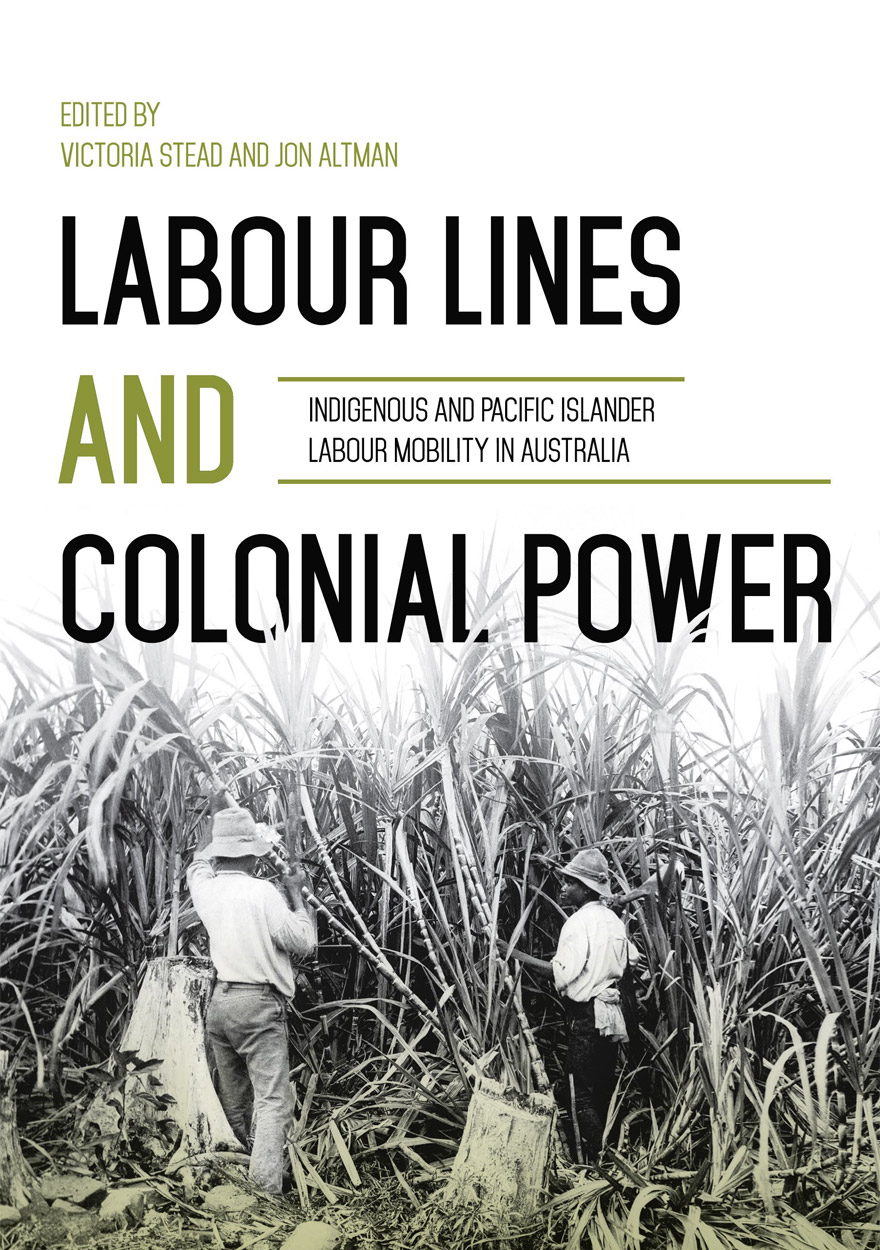
Labour Lines and Colonial Power »
Indigenous and Pacific Islander Labour Mobility in Australia
Edited by: Victoria Stead, Jon Altman
Publication date: August 2019
Today, increases of so-called ‘low-skilled’ and temporary labour migrations of Pacific Islanders to Australia occur alongside calls for Indigenous people to ‘orbit’ from remote communities in search of employment opportunities. These trends reflect the persistent neoliberalism within contemporary Australia, as well as the effects of structural dynamics within the global agriculture and resource extractive industries. They also unfold within the context of long and troubled histories of Australian colonialism, and of complexes of race, labour and mobility that reverberate through that history and into the present. The contemporary labour of Pacific Islanders in the horticultural industry has sinister historical echoes in the ‘blackbirding’ of South Sea Islanders to work on sugar plantations in New South Wales and Queensland in the late nineteenth and early twentieth centuries, as well as in wider patterns of labour, trade and colonisation across the Pacific region. The antecedents of contemporary Indigenous labour mobility, meanwhile, include forms of unwaged and highly exploitative labouring on government settlements, missions, pastoral stations and in the pearling industry. For both Pacific Islanders and Indigenous people, though, labour mobilities past and present also include agentive and purposeful migrations, reflective of rich cultures and histories of mobility, as well as of forces that compel both movement and immobility.
Drawing together historians, anthropologists, sociologists and geographers, this book critically explores experiences of labour mobility by Indigenous peoples and Pacific Islanders, including Māori, within Australia. Locating these new expressions of labour mobility within historical patterns of movement, contributors interrogate the contours and continuities of Australian coloniality in its diverse and interconnected expressions.



